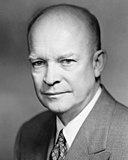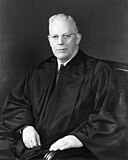
Back Primaires présidentielles du Parti républicain américain de 1952 French Elezioni primarie del Partito Repubblicano del 1952 (Stati Uniti d'America) Italian
| |||||||||||||||||||||||||||||||||||||||||||||||
1,206 delegates to the 1952 Republican National Convention 604 (majority) votes needed to win | |||||||||||||||||||||||||||||||||||||||||||||||
|---|---|---|---|---|---|---|---|---|---|---|---|---|---|---|---|---|---|---|---|---|---|---|---|---|---|---|---|---|---|---|---|---|---|---|---|---|---|---|---|---|---|---|---|---|---|---|---|
| |||||||||||||||||||||||||||||||||||||||||||||||
Eisenhower Taft Stassen Warren | |||||||||||||||||||||||||||||||||||||||||||||||
| |||||||||||||||||||||||||||||||||||||||||||||||
From March 11 to June 3, 1952, delegates were elected to the 1952 Republican National Convention.
The fight for the 1952 Republican nomination was largely between popular General Dwight D. Eisenhower (who succeeded Thomas E. Dewey as the candidate of the party's liberal eastern establishment) and Senator Robert A. Taft of Ohio, the longtime leader of the conservative wing. Foreign policy during the Cold War was a major point of contention, with Eisenhower taking an interventionist stance and Taft favoring greater caution and avoidance of foreign alliances. Eisenhower tended to accept many of the social welfare aspects of the New Deal, to which Taft was adamantly opposed.
Two other major candidate for the nomination, though never challenging Eisenhower or Taft, were Governor of California and Dewey's 1948 running-mate Earl Warren, and former Governor of Minnesota Harold Stassen, who had contended for the nomination in 1948 as well.
Taft, who was 62 when the campaign began and running his third presidential campaign, freely admitted that this would be his last chance to win the nomination. Taft's weakness, which he was never able to overcome, was the fear of many party bosses that he was too conservative and controversial to win a presidential election.[citation needed] The primaries were ultimately inconclusive, and the nomination was decided by a contest over delegates from Texas and Georgia; led by Dewey and Henry Cabot Lodge Jr., the Eisenhower campaign won a vote of the whole convention to award the contested delegates to Eisenhower, who carried the first ballot. The episode was reminiscent of the 1912 Republican National Convention forty years prior, where Taft's father won the nomination over Theodore Roosevelt by similar means.
In the general election on November 4, Eisenhower and his running mate, Senator Richard Nixon of California, defeated the Democratic party's ticket of Governor Adlai Stevenson II of Illinois, and Senator John Sparkman of Alabama.
© MMXXIII Rich X Search. We shall prevail. All rights reserved. Rich X Search





